


Stretching over 4,500 kilometers, the Mekong River is more than a waterway – it’s the lifeline of Southeast Asia. For centuries, it has nourished rice fields, sustained millions, and supported one of the most biodiverse freshwater ecosystems on Earth.
Today, the river is changing. In the past decade, a series of large dams in China, Laos, and Cambodia have altered its flow, reshaping both landscapes and livelihoods. The Mekong Delta in Vietnam, once a fertile rice bowl and home to rare wildlife, is now facing salinization, erosion, and dwindling fish stocks.
At the same time, sand mining and climate change intensify the pressure, deepening the river and threatening the delta’s fragile balance.
The Mekong remains vast and powerful, but its future, like the lives it sustains, hangs in delicate balance.
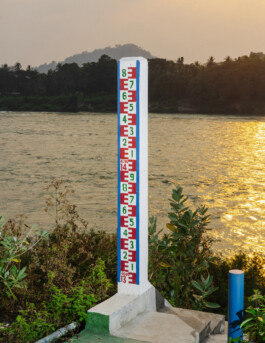
Mekong at the Si Phan Don in Laos.
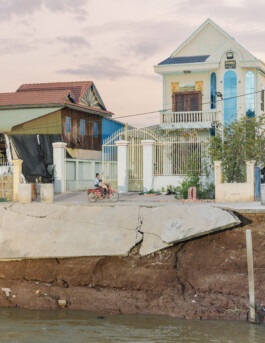
Prek Thi, Cambodia — In January 2023, a landslide swept six houses into a creek and forced another to be moved.
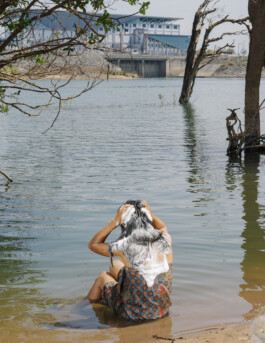
Don Sahong Dam, a hydroelectric plant on the Mekong River near the Laos-Cambodia border. Operational since 2020, it exports most of its power to Thailand and Cambodia and has raised concerns about its impact on fish and wildlife.
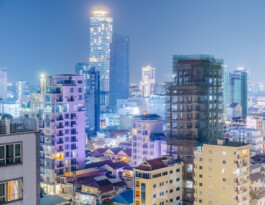
Phnom Penh’s construction frenzy is fueling the need for sand dredging, the practice of sucking up debris from riverbeds.
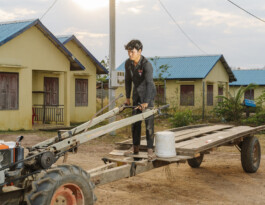
Residents of New Kbal Romeas, near Stung Treng, Cambodia, were displaced by the Lower Sesan II Dam. Many are Bunong, an Indigenous group with deep ties to their land — some relocated, others chose to stay behind.

The loss of mangroves threatens both wildlife and the communities that depend on them.
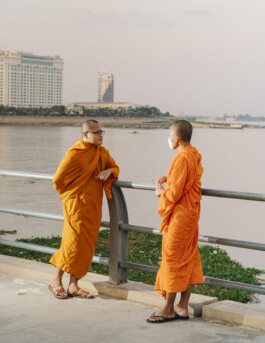
Monks in Phnom Penh, Cambodia, reside at the confluence of two vital tributaries, the Tonle Sap River and the Bassac, where they merge with the Mekong.
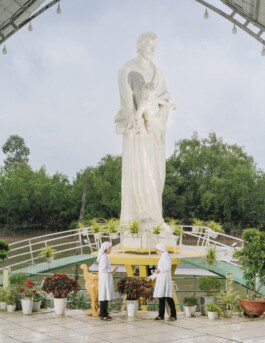
Thanh Tam Church in Rach Vop, Vietnam — rebuilt after a landslide swept part of it into the Mekong. Coconut trees now help protect it from erosion, and a large statue of Saint Joseph stands guard over the site.
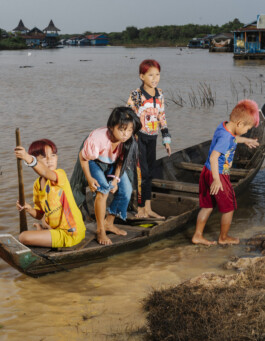
Children from the Vietnamese community at Chong Khneas, on Cambodia’s Tonlé Sap Lake. Many here are stateless, unable to own land or access full education, living in floating villages on the lake’s edge.
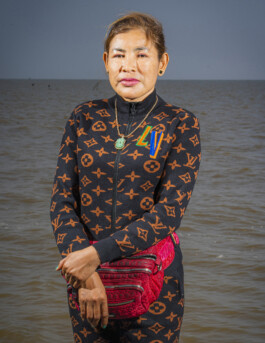
A local worker at a crocodile farm in Chong Khneas, Tonlé Sap. With fish stocks falling sharply, many residents now rely on tourism or crocodile farming to survive.
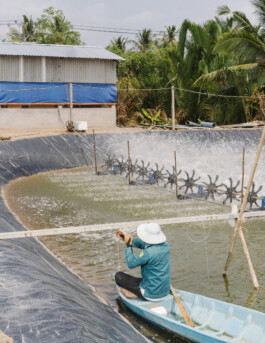
A shrimp farm in Tra Vinh province, Vietnam — the lowest part of the Mekong Delta. Here, the mix of salt and fresh water creates ideal conditions for shrimp farming, which has rapidly replaced coastal rice fields over the past decade.
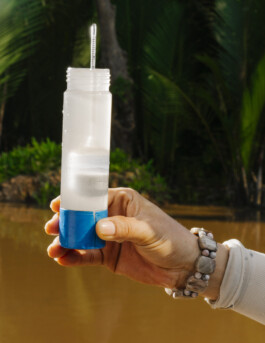
Salinity test in southern Vietnam. In this part of the Mekong Delta, salt levels exceed those of the ocean — a result of upstream dams and sand mining downstream.
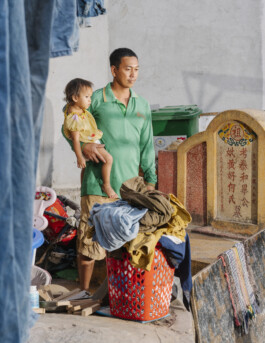
Many of the residents of this neighborhood, which was built on an old cementery, had to move here after their houses collapsed into the Mekong.
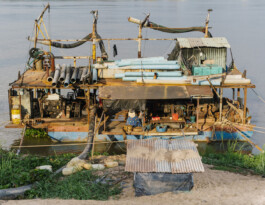
Sand farming boat in Phnom Penh.
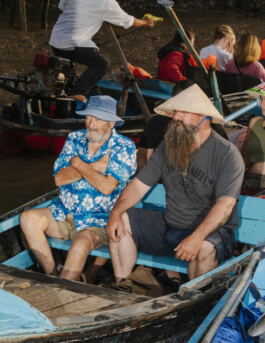
Tourists at the Phong Dien floating market in Can Tho, Vietnam. Once a bustling trade hub, it now sees more visitors than vendors.
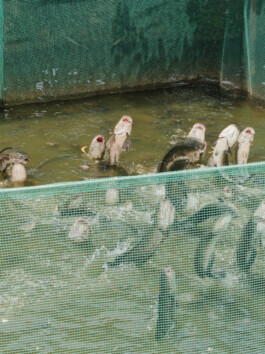
Fish farm in Con So Islet, Can Tho, Vietnam.

Fishermen at Si Phan Don, southern Laos — a river region known as the “4,000 islands.” Once central to local life and trade, it’s now increasingly shaped by tourism.
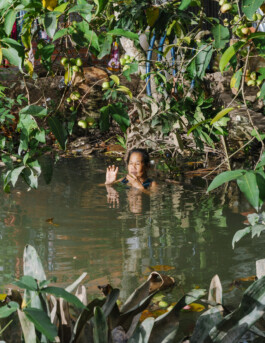
Woman bathing in a flooded area near her neigbourhood. In a recent flood, eight houses fell into the river.

Crocodile farm at Chong Khneas, Tonlé Sap.
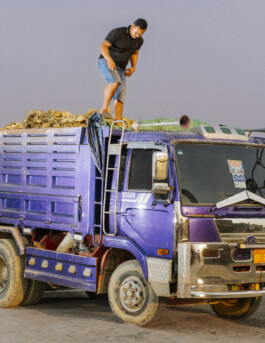
A worker moves sand at the ING City project in Phnom Penh, Cambodia. Built on former wetlands where the Mekong and Tonlé Sap meet, the city’s rapid development is reshaping vital natural drainage areas.
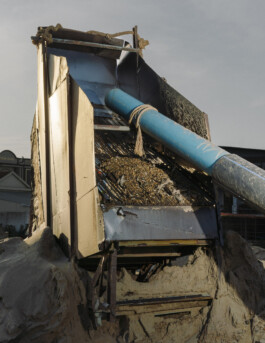
Sand mining device in Phnom Penh. The city’s construction boom drives demand for dredged river sand, used to clear waterways and fill land for new developments.
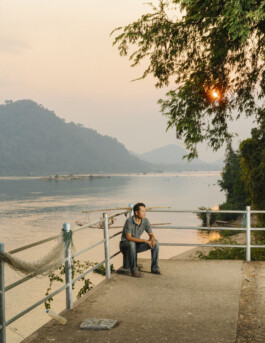
Khampha Srisuphan, a tour guide in Don Det near the Cambodia–Laos border, stands by the pool where river dolphins once lived. Until their extinction here in early 2022, he led tours to see them.
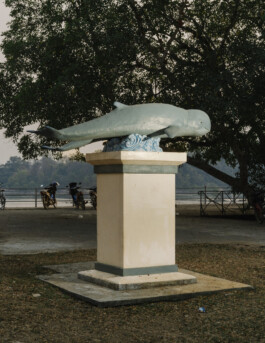
Statue in Don Det, Laos. In 2022, the last Irrawaddy river dolphin became entangled in fishing gear and died, signifying the extinction of the species in Laos.
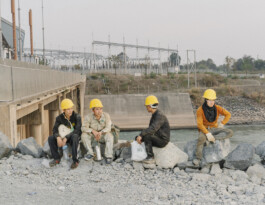
Construction workers in front of the Don Sahong Dam.
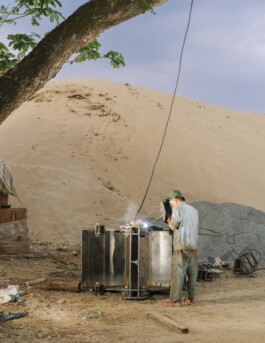
Metal worker in Can Tho, Vietnam. He is repairing an excavator arm used for moving sand out of the Mekong.

Tourist at Li Phi Somphamit waterfalls in Laos. These falls are known as the „spirit falls.“ Many Laotians believe the falls and rapids catch ghosts and spirits here.

Abandoned house at Hoa Ninh Village, Vinh Long province, in Vietnam. After a flood, eight of nine houses fell into the river. This is the last one remaining in the settlement.
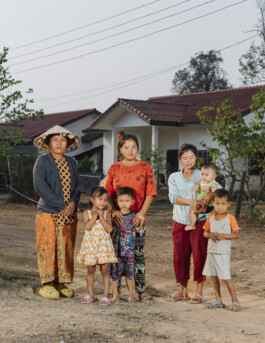
Villagers of Hang Sahong hamlet in Laos. They had to be relocated due to the construction of the Don Sahong Dam on whose expansion most of the young men from the village work.
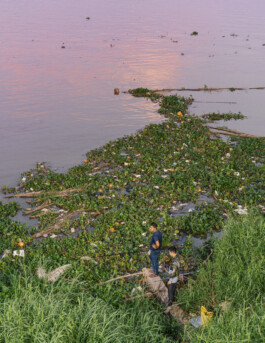
Fishermen in Phnom Penh, Cambodia.
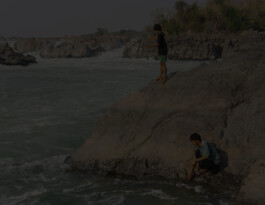
Mekong's Fight for Survival ↓


Prek Thi, Cambodia — In January 2023, a landslide swept six houses into a creek and forced another to be moved.

Don Sahong Dam, a hydroelectric plant on the Mekong River near the Laos-Cambodia border. Operational since 2020, it exports most of its power to Thailand and Cambodia and has raised concerns about its impact on fish and wildlife.


The loss of mangroves threatens both wildlife and the communities that depend on them.

Residents of New Kbal Romeas, near Stung Treng, Cambodia, were displaced by the Lower Sesan II Dam. Many are Bunong, an Indigenous group with deep ties to their land — some relocated, others chose to stay behind.

Monks in Phnom Penh, Cambodia, reside at the confluence of two vital tributaries, the Tonle Sap River and the Bassac, where they merge with the Mekong.

Thanh Tam Church in Rach Vop, Vietnam — rebuilt after a landslide swept part of it into the Mekong. Coconut trees now help protect it from erosion, and a large statue of Saint Joseph stands guard over the site.

Children from the Vietnamese community at Chong Khneas, on Cambodia’s Tonlé Sap Lake. Many here are stateless, unable to own land or access full education, living in floating villages on the lake’s edge.


A shrimp farm in Tra Vinh province, Vietnam — the lowest part of the Mekong Delta. Here, the mix of salt and fresh water creates ideal conditions for shrimp farming, which has rapidly replaced coastal rice fields over the past decade.
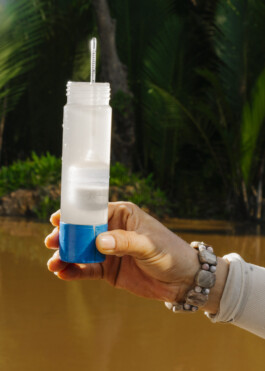
Salinity test southern Vietnam. The water in this part of the Mekong delta shows a salinity of over 15, which is even higher than the ocean‘s salinity. The increasing salinity in the Mekong Delta is currently being driven by the building of dams upstream and sand mining downstream.

Many of the residents of this neighborhood, which was built on an old cementery, had to move here after their houses collapsed into the Mekong.


Tourists at the Phong Dien floating market in Can Tho, Vietnam. Once a bustling trade hub, it now sees more visitors than vendors.

Fish farm in Con So Islet, Can Tho, Vietnam.

Fishermen at Si Phan Don, southern Laos — a river region known as the “4,000 islands.” Once central to local life and trade, it’s now increasingly shaped by tourism.

Woman bathing in a flooded area near her neigbourhood. In a recent flood, eight houses fell into the river.

Crocodile farm at Chong Khneas, Tonlé Sap.

A worker moves sand at the ING City project in Phnom Penh, Cambodia. Built on former wetlands where the Mekong and Tonlé Sap meet, the city’s rapid development is reshaping vital natural drainage areas.

Sand mining device in Phnom Penh. The city’s construction boom drives demand for dredged river sand, used to clear waterways and fill land for new developments.

Khampha Srisuphan, a tour guide in Don Det near the Cambodia–Laos border, stands by the pool where river dolphins once lived. Until their extinction here in early 2022, he led tours to see them.

Statue in Don Det, Laos. In 2022, the last Irrawaddy river dolphin became entangled in fishing gear and died, signifying the extinction of the species in Laos.

Construction workers in front of the Don Sahong Dam.

Metal worker in Can Tho, Vietnam. He is repairing an excavator arm used for moving sand out of the Mekong.

Tourist at Li Phi Somphamit waterfalls in Laos. These falls are known as the „spirit falls.“ Many Laotians believe the falls and rapids catch ghosts and spirits here.
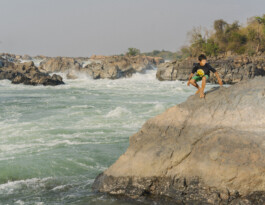

Abandoned house at Hoa Ninh Village, Vinh Long province, in Vietnam. After a flood, eight of nine houses fell into the river. This is the last one remaining in the settlement.

Villagers of Hang Sahong hamlet in Laos. They had to be relocated due to the construction of the Don Sahong Dam on whose expansion most of the young men from the village work.

Fishermen in Phnom Penh, Cambodia.